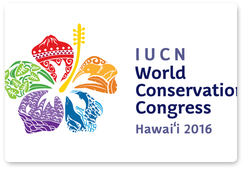One of the events at the IUCN World Conservation Congress in Honolulu (Hawaii, USA) on 5 September was a round table on rare cat conservation, organised by Yelena Shevtsova, deputy director for research at Land of the Leopard National Park; Dmitry Gorshkov, director of the Sikhote-Alin Biosphere Reserve; and Olga Kirilyuk, senior researcher at the Daursky Biosphere Reserve.
Ms Shevtsova presented a report on international cooperation to preserve Far Eastern leopards and Amur tigers. She said that Russia’s priority is not just to implement the conservation programme at the national level, but also to organise international cooperation, given that the leopards and tigers inhabit not just parts of Russia’s Far East, but also China and North Korea.
“Tigers and leopards don’t have passports and cross borders unhindered,” she said. “When their population grows, they will naturally start spreading out to their native range, and we want to be sure that they will be protected beyond the limits of the nature reserves and Russia’s state borders.”
Speaking at the round table, Michael Baltzer, leader of WWF’s Tigers Alive Initiative, and Khalid Pasha, coordinator of WWF’s Conservation Assured | Tiger Standards – CA|TS certification project, presented Land of the Leopard with a document confirming registration of the park’s application to obtain the CA|TS certificate. This will make the national park the second in Russia and the third in the world to go through the procedure for obtaining this international certificate. Chitwan National Park in Nepal and the Sikhote-Alin Biosphere Reserve in the Primorye Territory have already received the certificate.
Representatives from Land of the Leopard also took part in a round table on working with the business community for wild cats’ conservation. There were 10 events dedicated to leopards and other wild cats at the congress in Honolulu.
The IUCN World Conservation Congress took place in Hawaii from 1-10 September, under the theme “Planet at the Crossroads.” More than 8,000 specialists from 170 countries attended the event. Specialists from the Ministry of Natural Resources and Environment and the Federal Service for Supervision of Natural Resources (Rosprirodnadzor) as well as officials from 24 nature reserves and national parks represented Russia at the congress. The event was organised by the International Union for Conservation of Nature, one of the world’s oldest environmental protection agencies. The organisation has 82 member countries and currently holds its congress once every four years.




 ABOUT THE PROGRAMME
ABOUT THE PROGRAMME
 FAR EASTERN LEOPARD RESEARCH: A HISTORY
FAR EASTERN LEOPARD RESEARCH: A HISTORY
 FAR EASTERN LEOPARD: LIFE, BEHAVIOUR AND MORE
FAR EASTERN LEOPARD: LIFE, BEHAVIOUR AND MORE
 SERGEY IVANOV'S VISIT
SERGEY IVANOV'S VISIT
 NEWS
NEWS
 MULTIMEDIA
MULTIMEDIA